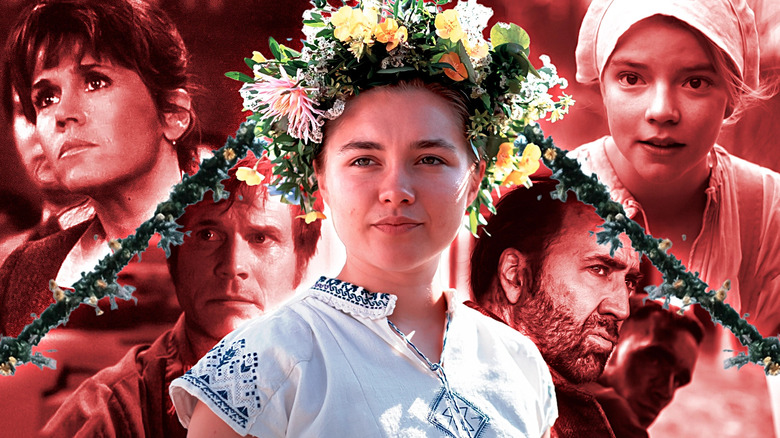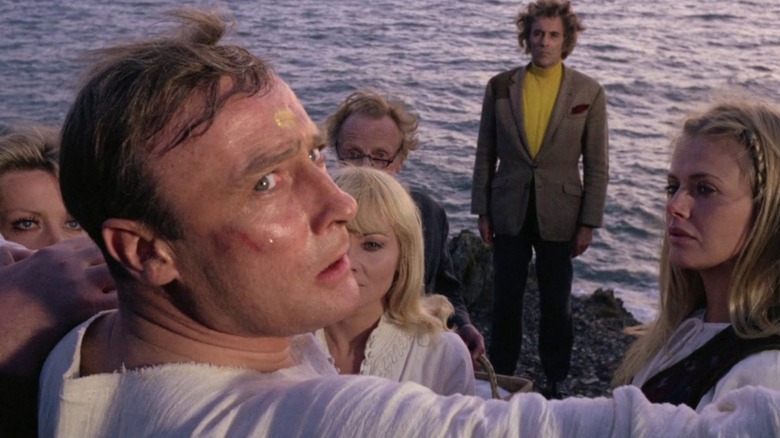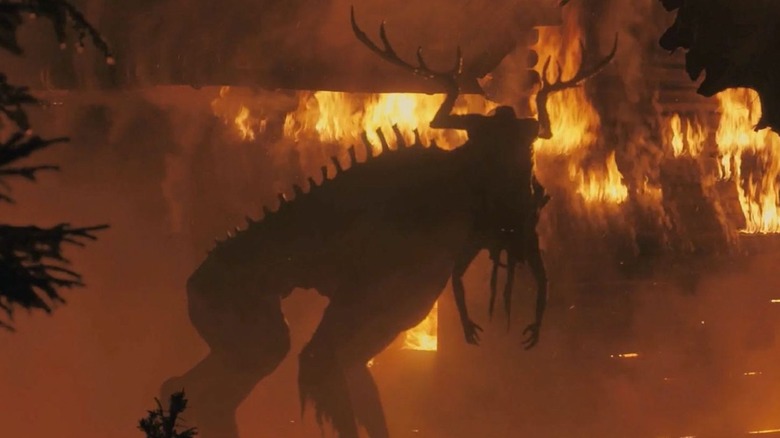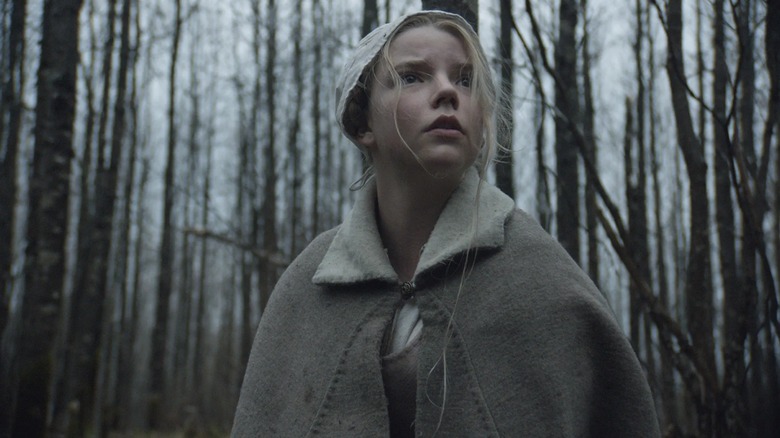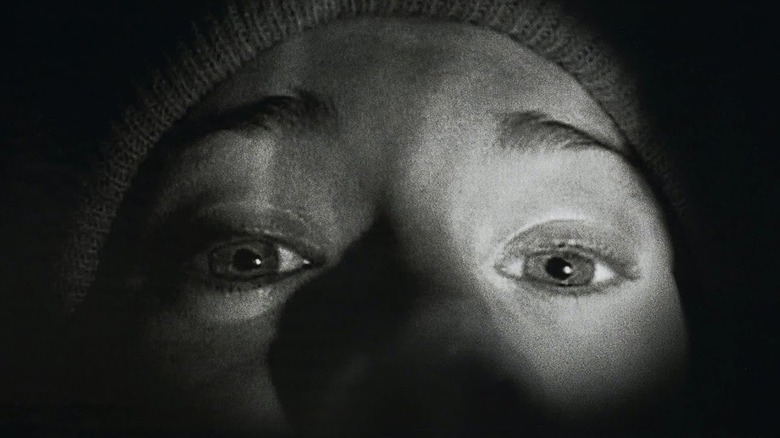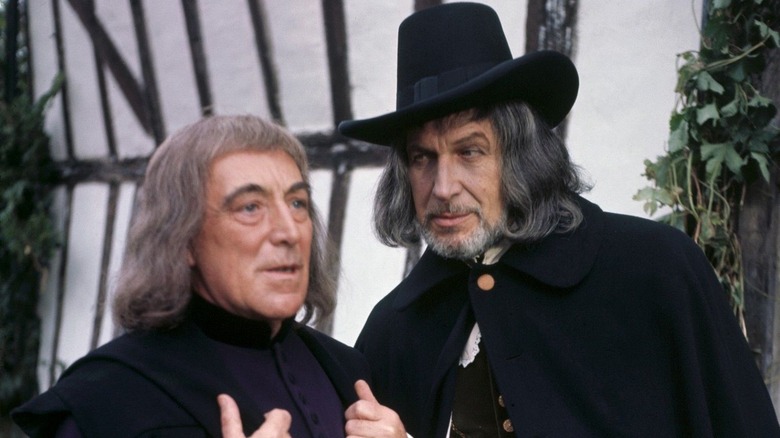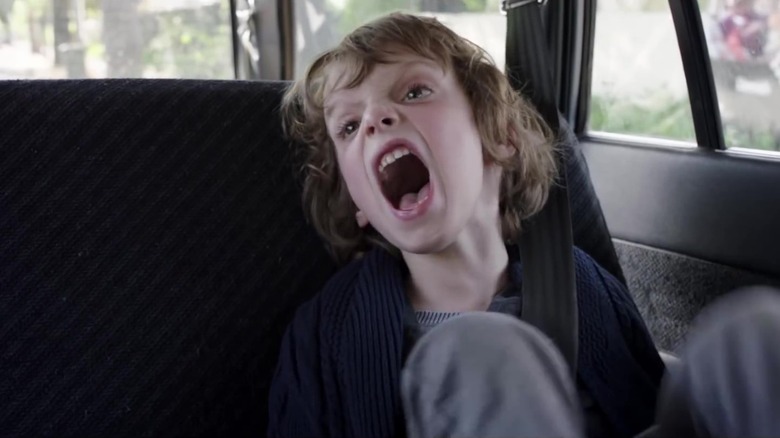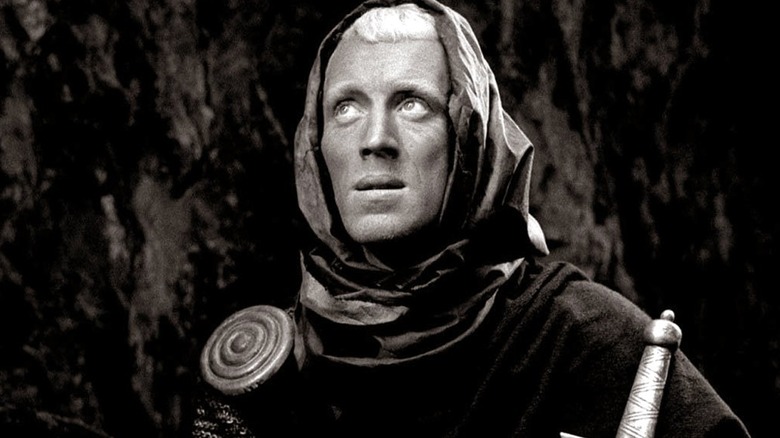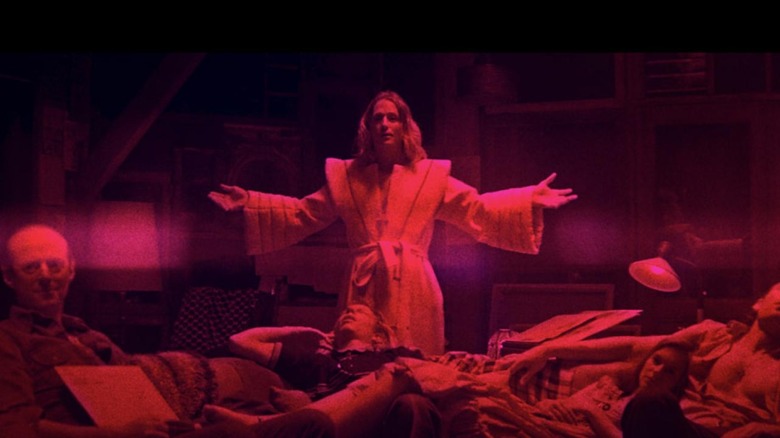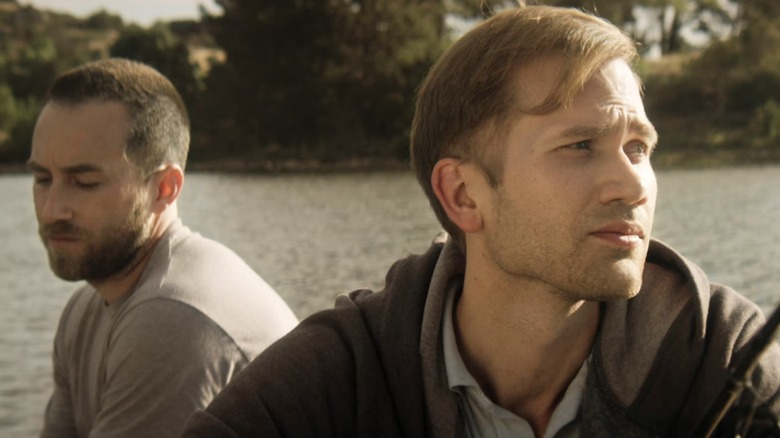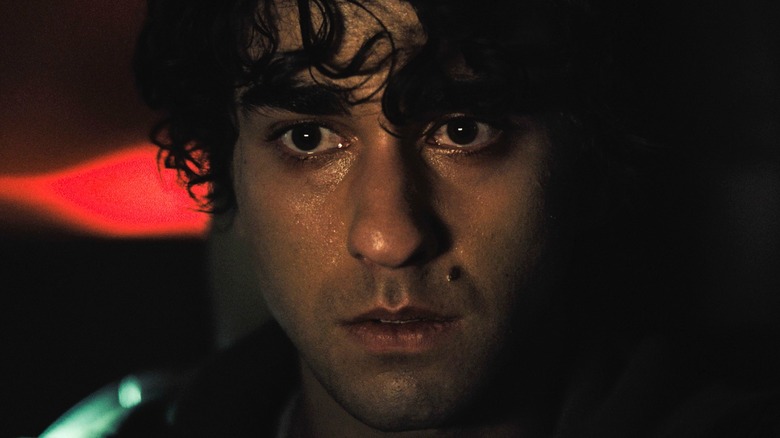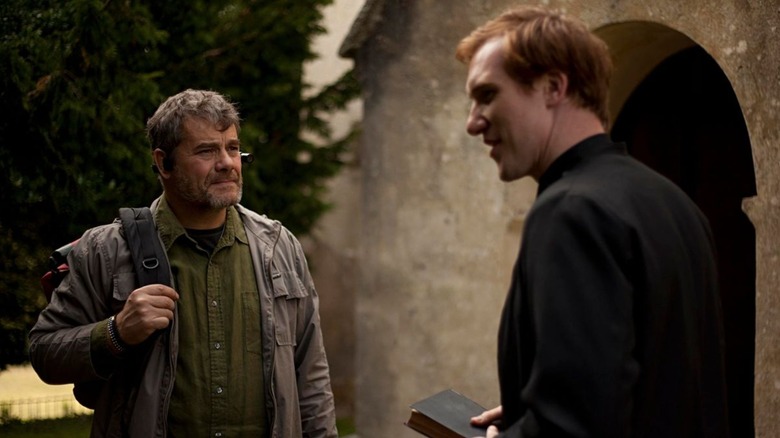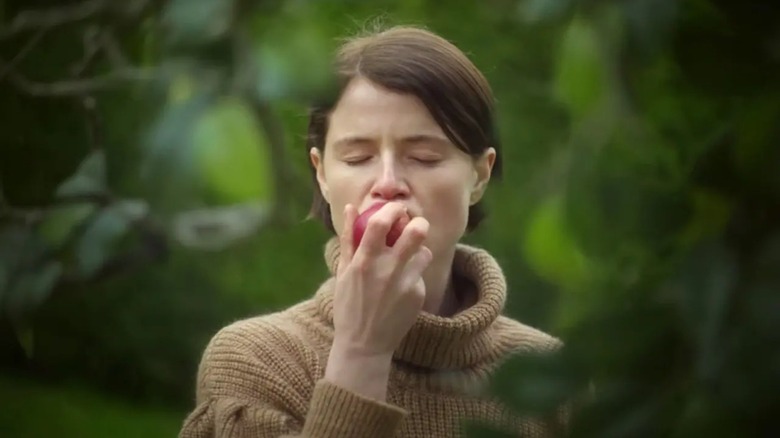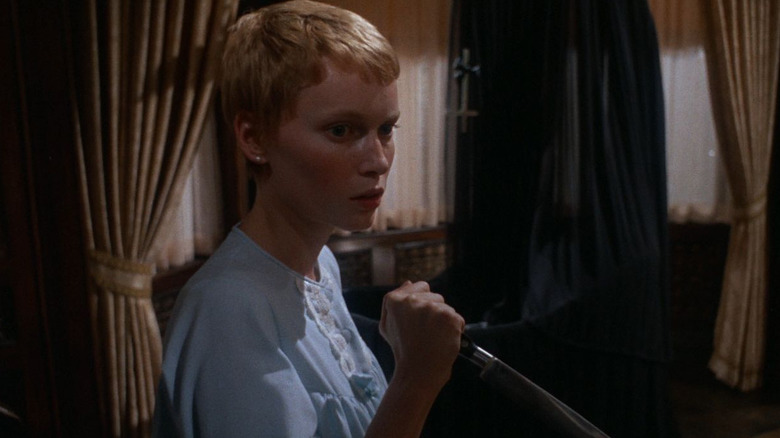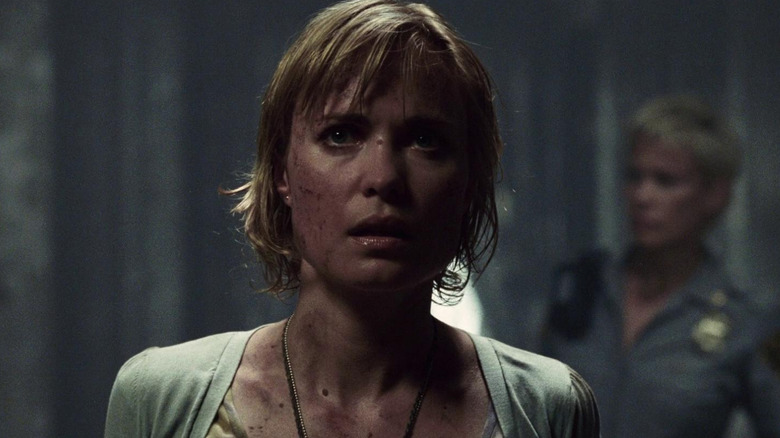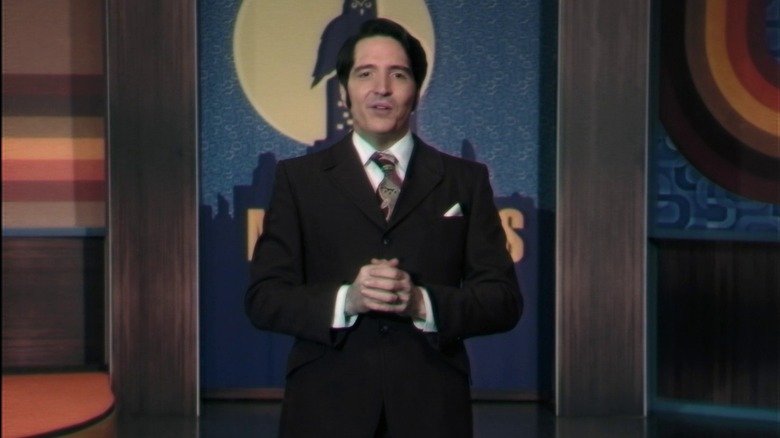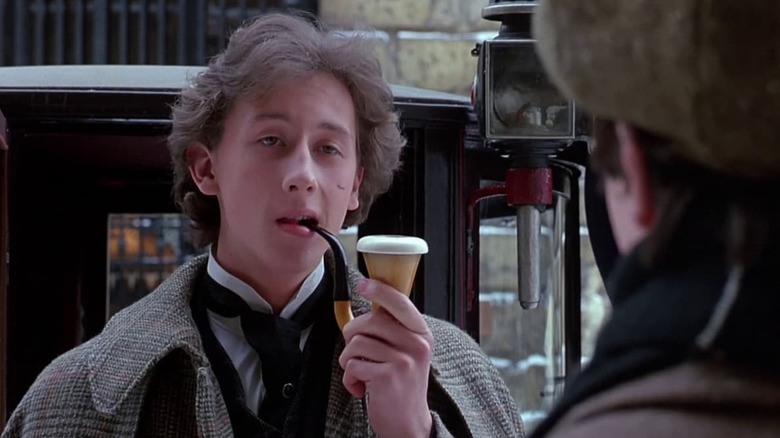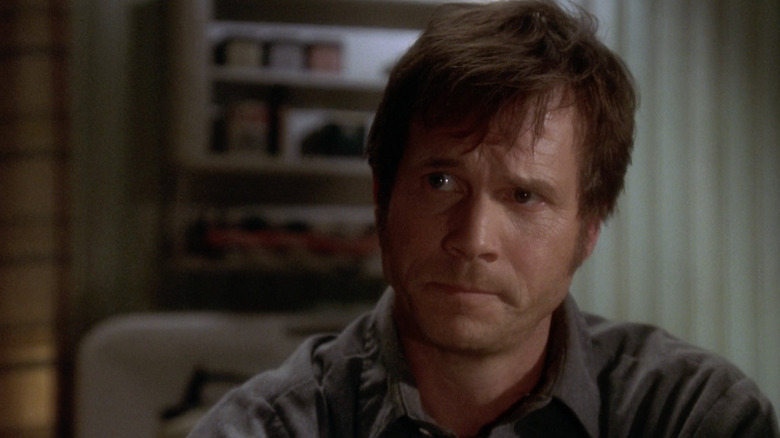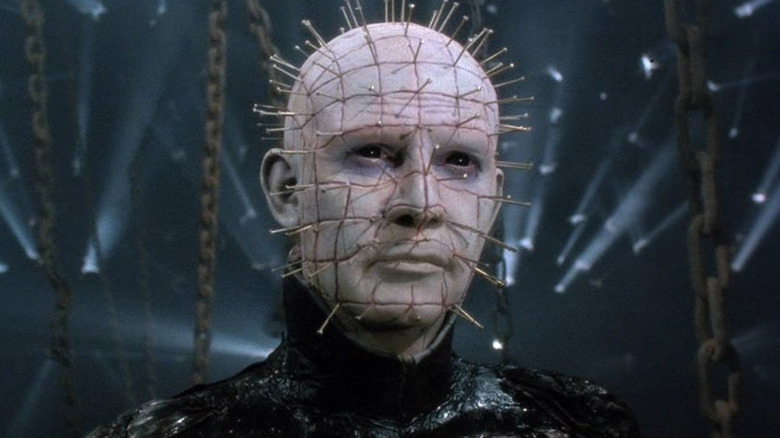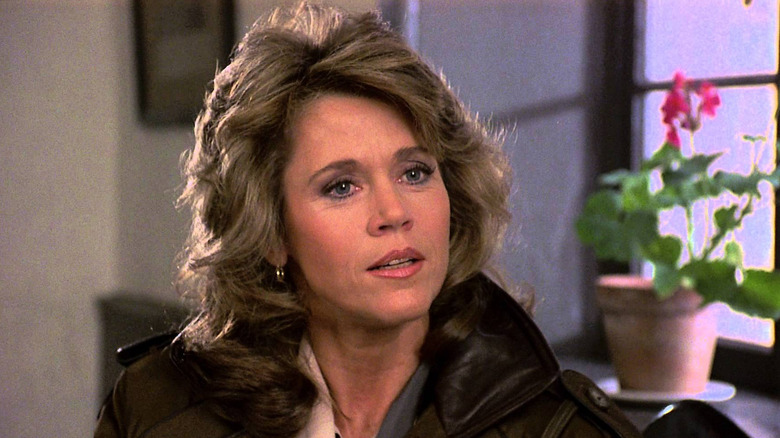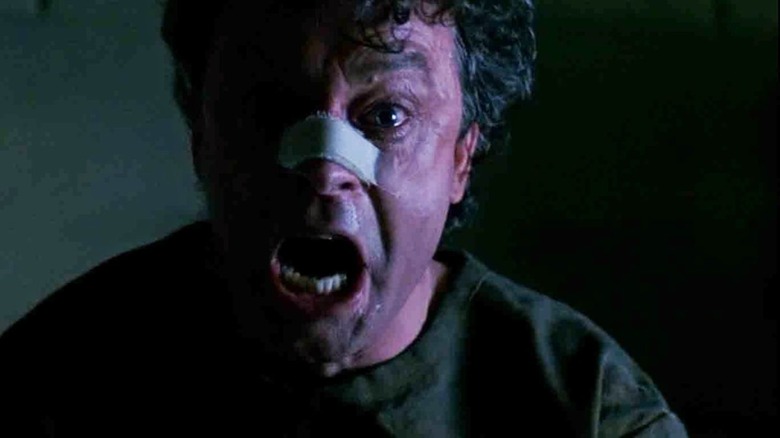20 Best Movies Like Midsommar
We may receive a commission on purchases made from links.
There's not much out there like Ari Aster's second horror outing, "Midsommar." It's the ultimate break-up movie, where Florence Pugh's Dani ditches her self-absorbed boyfriend Christian (Jack Reynor) in ways both satisfying and deeply disproportionate. It's about the seductive way cults make themselves your new family at the cost of everyone else. It's, similarly, about the seductive allure of Nazi eugenics. Everyone wants to belong. At Harga, the titular Midsommar festival, your hosts will make sure you fit into the right niche. Including the one six feet under.
While "Midsommar" takes a modern spin on all of these themes, its genre roots are old. Arthur Machen touched on the sublime attraction of obscure and dangerous faiths in "The Great God Pan," a tale that went on to inspire H. P. Lovecraft, while Mike Flanagan showed how easily one could dress those dangers in Christianity in "Midnight Mass." These tales are the folk horrors, the psychological religious horror, the stories that claw inside of us and ask what the redemption of our souls could really cost. There might be nothing quite like "Midsommar," but we do have twenty films that pull close to that dark little itch in the human spirit.
Get your curiously berry-color lemonade and your bear suit. We're the best movies like "Midsommar," with strange visions of faith and folklore.
The Wicker Man (1973)
Put the apiary down, Nicholas Cage, you get your turn in a later flick pick. The GOAT of folk horror is the original version of "The Wicker Man," starring Christopher Lee as the charming yet intense Lord Summerisle. Edward Woodward (of Edgar Wright's "Hot Fuzz," which cheekily plays around with this classic movie) is Sergeant Howie, a good Christian man sent to the isolated pagan island Summerisle to investigate reports of a missing girl named Rowan.
Howie is such a good Christian that he steadfastly ignores every freely given warning to get the hell off the island before the May Day festival, focusing on the conspiratorial lures of the islanders instead. Agonized, he ignores a primally erotic attempt to take his virginity his first night on the island. He tries to proselytize to the kids. He attempts to shame the residents into admitting what they know about Rowan, but all he's doing is backing himself into the titular creation, begging for God's guidance and salvation all the while. Good job, buddy. Now, whether all of will save Summerisle's wilting crops, well, that's in the hands of the gods of nature. One may get the sense that not even Lord Summerisle knows (or cares) if they exist.
The Ritual
"The Ritual" is based on a fun horror novel by UK genre fave Adam Neville, and there are a few things missing from the film adaptation that would give a Swedish death metal fan a good belly laugh. But those subplots would easily turn to camp on the big screen, so the movie instead focuses sharply on the heavy baggage of grief and survivor's guilt. Oh, and the revelation that there's something big and really screwed up thriving in the deep woods off the safe hiking trails.
Four buddies (including Rafe Spall of "Prometheus" fame and Sam Troughton, the ill fated Akimov of HBO's "Chernobyl") take to the Swedish woodlands to honor their fifth, slain the year before in a hold-up gone ugly. But there's always something waiting to go wrong on a long hike, and when one of them cranks their ankle, they consider a shortcut through thick forest in order to get him cared for quicker.
There's reasons seasoned hikers tell you not to do that (and maybe don't go in the first place), and these guys figure out most of them pretty quick. But what doesn't end up on the self-preservation pamphlets is the occasional secretive death cult (and their figure of adoration) deep inside the no man's lands. Maybe just stay with the tour guide, kids.
The Witch
Robert Eggers still thinks his premier outing "The Witch" was kind of a bummer, which is a shock to those of us absolutely enthralled by Ralph Ineson's prideful William dissolving into madness as he and his wife (Kate Dickie) can no longer tell when their kids are just being kids or if they've been subsumed by the Devil. Anya Taylor-Joy is eldest daughter Thomasin, who knows the answer, but her family enters a destructive spiral so thoroughly and so fast that it just makes things worse for her.
It's no wonder, then, that the Devil's promises might sound pretty good by the time everything is over. Being a young girl in a repressively religious era, derided by men and women both, is exhausting stuff. So perhaps the grim ending of "The Witch" is a foregone conclusion by the time the opening scenes wrap up. Black Phillip might be an ornery old goat with the silver tongue of the damned, but you know what? The way things are going today, I could probably be had for a good roll of Irish butter and a pretty dress, too.
The Blair Witch Project
Considering all the other films we've gone over before this point, by the time you've finished watching "The Blair Witch Project," you might get the hint that it's time to stop going into the woods whenever the locals tell you bad s**t keeps happening out there. The film that made found footage flicks into more than just a cheap horror genre, "Blair Witch" blends its raw, unrehearsed-feeling authenticity with off-screen scares and just enough veracity to pass as real New England folklore and Appalachian hexerei.
Hexerei is a special kind of syncretic Christian folklore that came over with the Pennsylvania Dutch. It's also called pow-wow, not to be confused with any Indigenous ritual, and if you've ever seen barn stars or a good Lancaster County quilt, you've seen some of the symbols these anti-witch practitioners used. They haven't worked in Burkittsville, Maryland, apparently, and whatever's thriving in the woods doesn't want visitors snooping around trying to uproot them. We never actually get to see the famed Blair Witch. We just see the effect she's having on three hikers that, as we know up front, never got to come back home.
Witchfinder General
Very loosely based on the malicious exploits of the real, self-proclaimed witchfinder, William Hopkins, "Witchfinder General" sees Vincent Price at his least campy and most bleakly terrifying. Classified as folk horror without any "real" witches or supernatural affect, the horror here is from how thoroughly Hopkins convinces himself of the worthiness of his duty, even as he's engaging in corruption, murder, and assault sometimes for the sheer merciless power fantasy of it all.
Hopkins finally goes too far when he and his even more sordid sidekick John Stearne pick on a village priest over absurd accusations of witchcraft, and the priest's niece, Sara, gets pulled into the morass. See, Sara has a soldier boy fiancee with a head heavy and full of righteous justice, and that man's not going to stop hunting Hopkins until he gets his revenge. "Witchfinder General" is not a happy film, and it's probably Price's most searing and uncomfortable work. It's nonetheless one hell of a ride, and a testament to the self-empowering cruelty that drives men granted too much freedom.
The Babadook
Turns out there's more than one way to handle your emotions than just putting your soon to be ex in a bear suit and sacrificing him in a fire. You can also find out your grief has taken on a monstrous, supernatural form and is now lurking around your house breaking your stuff and driving your poor kid past the point of derangement. We've all had a day like the one where Sam is 100% losing his stuff entire in the back of the car while his mom doesn't even know what to do about it anymore. Why can't we be normal, indeed.
Essie Davies (now starring in "Alien: Earth") is the haunted woman at the heart of "The Babadook," a single mother of a young boy who's never known his father. He died the day his son was born. That's already more than enough hell for anyone to bear, but the titular Babadook shows what grief is really like. When it's deep enough, you can't wish it away. You can't even defeat it, exactly, although therapy will help. But maybe you can learn to accept it on your terms. "Normal" is what you make of it.
The Seventh Seal
Somewhere between comedy and existential horror lies the Ingmar Bergman classic, "The Seventh Seal." You probably at least know it's the movie where a chilly, hooded Death plays chess with a mortal (Max von Sydow) for the cost of one human life, long before Bill & Ted moved him towards simpler party games and a fondness for '90s slang. It's also about the struggle to live in a world that's withering all around us.
Sydow's weary soldier and his squire are moving through a world afflicted with the plague, and so Death follows wherever they go. Their journey is an earthy one, as minstrel troupes and artists all get their moment to opine philosophically (but not boringly) about their circumstances and the silence that awaits every life at its end.
In the end, it's that silly minstrel — and Death himself, who's not above a little slapstick while woodland creatures watch — that's got the healthiest outlook on things. "The Seventh Seal" is proto-folk horror and far more human a watch than its black and white aesthetic and heavy subject matter (it's all death, from top to bottom, folks) would suggest.
Mandy
Far more pulpy and seemingly masculine than Ari Aster's film, "Mandy," by the beautifully mad director Panos Cosmatos, also takes a searing look at cults and their diseased idea of fellowship. Cosmatos' speciality is that liminal region of the '70s and '80s, where the New Age and Satanic panic overlapped into a cultural mania, which actually turned out to be worth not much more than a nice smelling bundle of Hem incense. His cynicism underlines the story of "Mandy," even as he uplifts the imaginative beauty of the titular Mandy (Andrea Riseborough).
Sacrificed by Jeremiah Sand (Linus Roache) as if she were a witch, Mandy's death ignites Red (Nicholas Cage), and the movie turns into a surrealistic nightmare blend of apocalyptic violence, all of which would look rad as hell painted on the side of a van. It's not for everyone, with cinematography both eye searing and magical, but if "Mandy" is for you, there will never be another movie you'll ever love as much as this one.
The Endless
Placed high on the Hollywood map by their work on Marvel's "Moon Knight," "Daredevil," and "Loki," directors Justin Benson and Aaron Moorhead's previous works are must-watches for horror fans with a taste for the new weird. "The Endless," which also stars the pair as brothers, blends the saccharine yet welcoming fellowship of cult communes with eldritch horror.
Justin and Aaron (their character names, because really, why make it more difficult for themselves?) return to the remote commune that raised them as children, with wildly differing memories about their childhood. Yeah, there's a bit of a leap between frolicking in this bucolic nature preserve and thinking you're trapped by a UFO-obsessed death cult.
Their one-day visit is prompted by the commune's promises of ascension, whatever the heck that may mean. But one day in Camp Arcadia isn't the same sort of day as anywhere else, in the most horrifying and literal sense, and there's a hell of a shock in finding out your existence may really be just some unbearable God's disposable plaything.
Hereditary
If "Midsommar" traumatized you a little but you still had a good time, you might as well go back one in Ari Aster's film resume and get the full roller coaster experience. "Hereditary" carries a few similar themes in how it handles grief, trauma, and the realization that there's a less than healthy cult eagerly poking at the edge of your existence to find an entry into your soul.
It's also the film where star Toni Collette demonstrates what a mother's agonizing howl would genuinely sound like, as the most horrific of family tragedies happens in what's just the first act teaser of how bad things are really gonna get in the Graham household. When it actually happens, you might wonder if there's going to be anything worse than what you just saw. Buckle up, kids. It gets so much worse.
Alex Wolff, as eldest son Peter, carries the heavy brunt of guilt and pretty much everything else as the family unravels. For horror nerds that know the more obscure details of demonology and whatnot, you'll be delighted with the informative and mostly accurate bits about which terrible patron is messing with this bedeviled family. For everyone else, wow, and you thought your family was messed up.
The Borderlands
Hidden 2013 found footage indie flick "The Borderlands" may also turn up as "Final Prayer" when you're trying to find it and both titles work nicely. Overlapping with religious horror of a most enjoyably Catholic bent, this one's also a great rec for fans of the Paramount+ series "Evil."
Featuring a group of Vatican investigators sent to see if a tiny, rural church really is a hotbed of some form of strange spiritual power — a real thing that the Vatican occasionally does — the placement of the cameras and the framing element of one of these investigators having gone through something real and terrible once before adds a nice veracity to the story. It's a set-up that can get you invested even if you're normally attuned to the extreme fictionality of most found footage flicks.
Taking a few modernized tacks from "The Wicker Man," there's a lot more going on in this far off parcel of English territory than first assumed. The climax veers straight on into a wild bout of eldritch horror that's been clearly foreshadowed yet suddenly pays off in a gleeful, almost absurd way that fits perfectly. If you wrap up the film going, "Did I see that right?" The answer is yes, yes you did.
Men
Alex Garland and Greta Gerwig have something in common. Both put out a generally acclaimed movie that got derided for its on the nose feminism as offered by a male director trying his best, and how surely we don't films to be so unsubtle about these themes. Considering the current world, frankly, we need a few more of these "blatant" feminism movies. They're not that blatant to the audience that still needs to figure out how much toxic masculinity sucks for everyone. Yes, men, too.
Anyway, "Men" is partially about how women can't even grieve without dudes trying to make it about themselves, a theme Florence Pugh's Dani would drink to. Jessie Buckley is Harper, a widow trying to navigate the complicated feelings of her husband's suicide, which he has somewhat successfully painted in her mind as her fault. Rory Kinnear, meanwhile, is every guy in the movie, yeah, even the kid, suggesting that male bad behavior follows certain recognizable patterns. The dismissive response of boys will be boys gets a special shout-out before things go incredibly sideways.
Hovering in the background of it all is the obscurely understood folklore of the Green Man, mostly seen as a figure of renewal and fertility, supplanting the usual feminine depiction of this role, which gets, um, extremely literal in one of the most unique sequences in modern horror.
Rosemary's Baby
There have been a lot of ladies in this list who could turn up at a Girl's Night with poor Dani, and let's put Rosemary Woodhouse (Mia Farrow) in as their guest of honor. By the time "Rosemary's Baby" rolls credits (reminding you of its controversial director), you'll know in your heart Rosemary wishes she could have put Guy (John Cassavetes) in that bear costume.
Rosemary arguably has it a little worse. She's a housewife in a big, rickety apartment with weird neighbors, alone while her egotistical spouse is trying to get big acting gigs. She's fine with that, but a kid would pull it together for her. Unfortunately, for her to get that kid, well, Guy's gonna have to make a few sacrifices, if he wants what he thinks is best for both of them. Naturally, it's Rosemary that gets to pay.
Still shocking in places, with one of the most raw and emotional — yet story-important — assault scenes in horror history, "Rosemary's Baby" might actually leave an Ari Aster fan thinking, y'know, I guess it could get even worse for an Aster protagonist.
Silent Hill
With a third film, "Return to Silent Hill," threatening the big screen next January — always a sign of quality, the dreaded January release — it may be best to return to the visual feast of Christophe Gans' original "Silent Hill." With the legendary Sean Bean as the film's token dude, the stacked cast of female actors, from Alice Krige to Laurie Holden ("The Walking Dead"), carries the film on a weird chorus of "god forbid women do anything."
From the sturdy motorcycle cop (Holden) to the frightened mother (Radha Mitchell as Rose), and definitely including Krige doing a wild and wonderful nigh-psychotic priestess of the Brethren, there's a little more room for one more bonkers female character trope: the magical but forsaken child. Fans of the "Silent Hill" video game franchise know that nothing good is going to happen to any of these characters, but hey, at least Pyramid Head is there to make it all even more upsetting. Insider hint: Pyramid Head's appearance makes zero sense outside the context of the second video game, but that's never stopped anyone from using a cool villain wherever possible.
Late Night With the Devil
Horror superfan and Vincent Price-tier character actor (the highest of compliments intended) David Dastmalchian helps turn "Late Night with the Devil" into something special, hooked on one of the most obvious statements ever made: You bet your butt every classic late night host, from Geraldo to Montel Williams, would sell their lungs to catch the real Lucifer on a hot mic.
Dastmalchian's talk show host Jack Delroy seems gentle and almost feckless compared to his big name counterparts, but the fictional Delroy has a few hidden fangs, and he earned a good following in an alternate vision of the '70s. He also comes right up to the edge of losing it all, with his survival mostly thanks to his involvement with the Grove, loosely based on a real life social club that collects a lot of wild rumors. Fortunately for us, the real Bohemian Grove isn't inextricably intertwined with a satanic cult focused on the complicated Gnostic figure of Abraxas. Unfortunately for Delroy, Abraxas has something special in mind for his first big TV interview.
Young Sherlock Holmes
Older fantasy and science fiction fans collect obscure faves, and for my money, there's an intangible but unique link between the 1983 World Fantasy award winning novel "The Anubis Gates" by Tim Powers and the transcendently weird "Young Sherlock Holmes." You might not have heard of either. Here's the link: In Victorian England, after the British occupation of Egypt, there's both a fascination with and suppression of Egyptian relics and myths. This prompts the rise of would-be magus cults seeking to harness the ancient Gods for their own uses.
Setting Power's book developments aside, "Young Sherlock Holmes" (one of the many Sherlock adaptations out there) takes the above, adds in Holmes and Watson as boarding school lads bound by fate and a love for chaos, and then hides Moriarty in plain sight dead bang in the middle of this steampunk fable about men cursed by futtering around in pyramids and priests of Osiris not above a little human sacrifice to even up an old score. It also features one of the very earliest uses of true CGI, in a hallucinatory sequence that holds up well.
Frailty
Families often use hobbies to bond together, and there's nothing like a little religious mania and demon hunting to keep those bonds deadbolt tight. "Frailty" puts Bill Paxton (who also directs) at the head of a rather intense single-dad household, where pop starts telling the kids angels are telling him to hunt down demons in the name of God. They could have gone fishing for summer instead, but nope. God's Army.
The story is framed by Matthew McConaughey as one of Paxton's adult children, confessing to an FBI agent (Powers Boothe) about a string of murders known as the God's Hand killings. The film expertly toys with the spiritual weight of whether or not God would tell someone to kill, even for the right cause, and whether or not demons truly do walk among us. The ending is one of those things that'll stick with you for weeks after watching, picking through and unknotting it all until you give in and rewatch it, just to realize that, yup, the film really is that good.
Hellraiser
If we had a nickel for every movie with a theme about seducing an innocent person into a world they could not imagine, you could melt those nickels down and polish up Pinhead's iconic pins real nice. I bet he'd like that. The original "Hellraiser," written and directed by Clive Barker, holds nothing back when it comes to pushing deep into things most ordinary people would consider taboo, from fetishistic sex and torture play, to twinges of incest to turning the ascetic Catholic idea of Hell into a soupçon of nightmare creatures who like it the roughest way possible.
Heresy is just a good time for the Hell Priest Pinhead (Doug Bradley), but if there's one way to get on his bad side, it's to break the few rules he has for his kinky little pain games. As Kirsty (Ashely Lawrence) finds out, her gross uncle has no problem throwing her dad, Larry (Andrew Robinson, "Deep Space Nine") under the bus to try and avoid his hellish debts. Fortunately for her, Hell Priests have a curious sort of honor when it comes to doing them a solid. Mostly. Kind of. Well, there's a load of sequels for a reason.
Agnes of God
Let's keep this heresy train running with a film that's lighter than many on this list, but still carrying enough psychological weight to lock down an industrial dumpster. "Agnes of God" is a slow burning investigative thriller with Jane Fonda as a secular court psychiatrist tasked with determining how, exactly, a dead baby wound up in a nun's bedroom. Yes, that sounds like the set up for one hell of a dark joke, but the truth loops its way through decades of secrets and presses against the limits of Agnes's (Meg Tilly) sanity.
What's never answered for certain — and you should go in knowing this the point — is whether the events have any divinity veiled behind them. By the end the answer is probably not, but that itself isn't the issue. The issue is what effect this all has on the severely undereducated Agnes, and the real crime is how little agency she's been granted in her life. A bit camp but also deeply affecting, "Agnes of God" asks the kinds of questions that get you frog-marched out of the pastor's office. Glad someone tried it.
The Exorcist III
When finally sitting down the second best "Exorcist" film for your first viewing, you may find a couple of different versions. Begin with the original theatrical release, with its shoved-in exorcism subplot that at least allows for a pretty nifty finale, and then pull up Scream Factory's "Exorcist III: Legion" director's cut. It's clumpy in places, collated from dailies and other unused footage, but still a fascinating look at Blatty's original idea for the film. Also, it has more Brad Dourif. You can never go wrong with Brad Dourif, especially when they're giving him delicious monologues like the ones he has here.
No matter which one we're talking about, "The Exorcist III" is chock full of snappy dialogue, absolutely bizarre people, Vantablack moments of comedy, a couple of the wildest murders in horror, and a return to the psychological warfare of the original "Exorcist." In sum, it may not be a very good sequel, but taken by itself, "Legion" is something so unique that it's no wonder it started off utterly loathed. It's secretly amazing, and a true cult classic, in every sense of the term.
